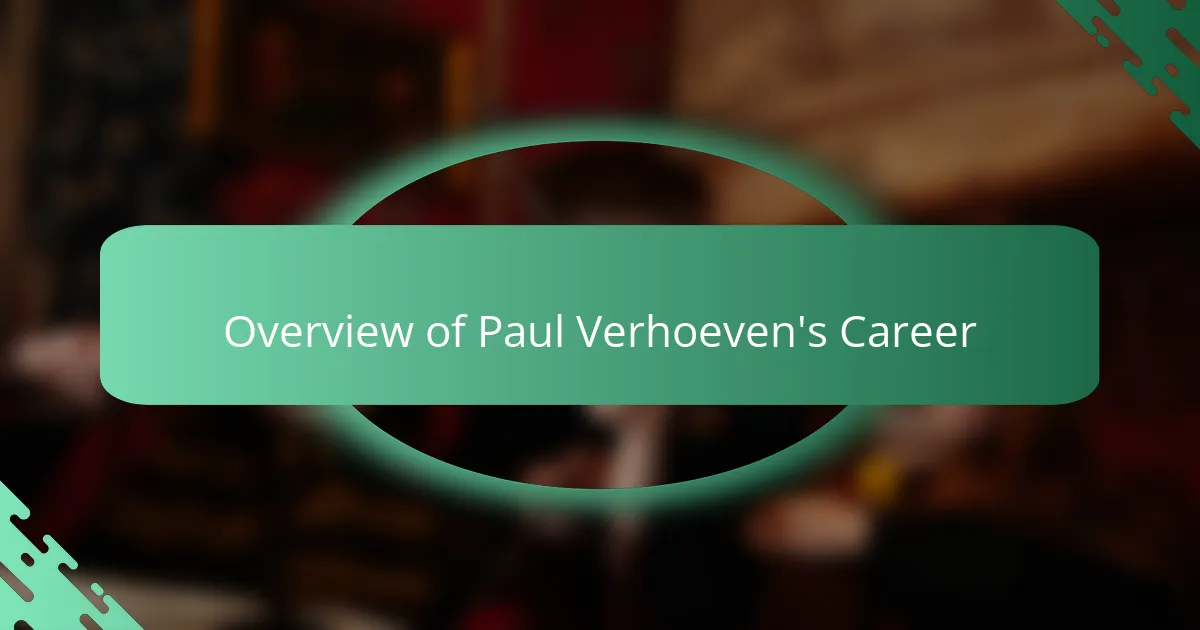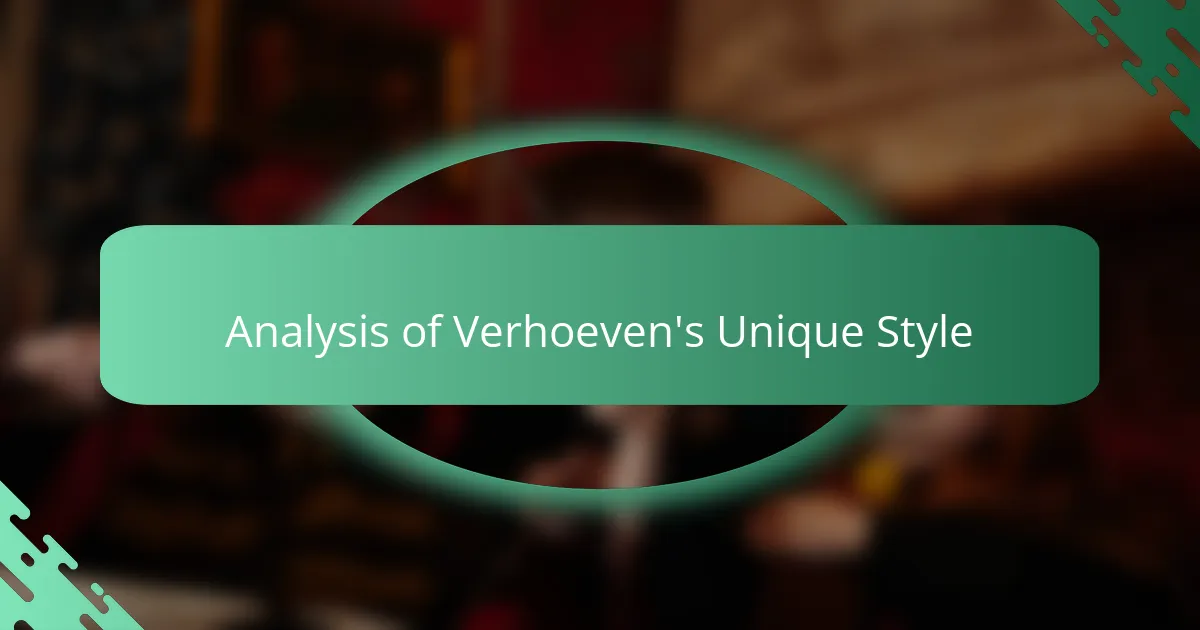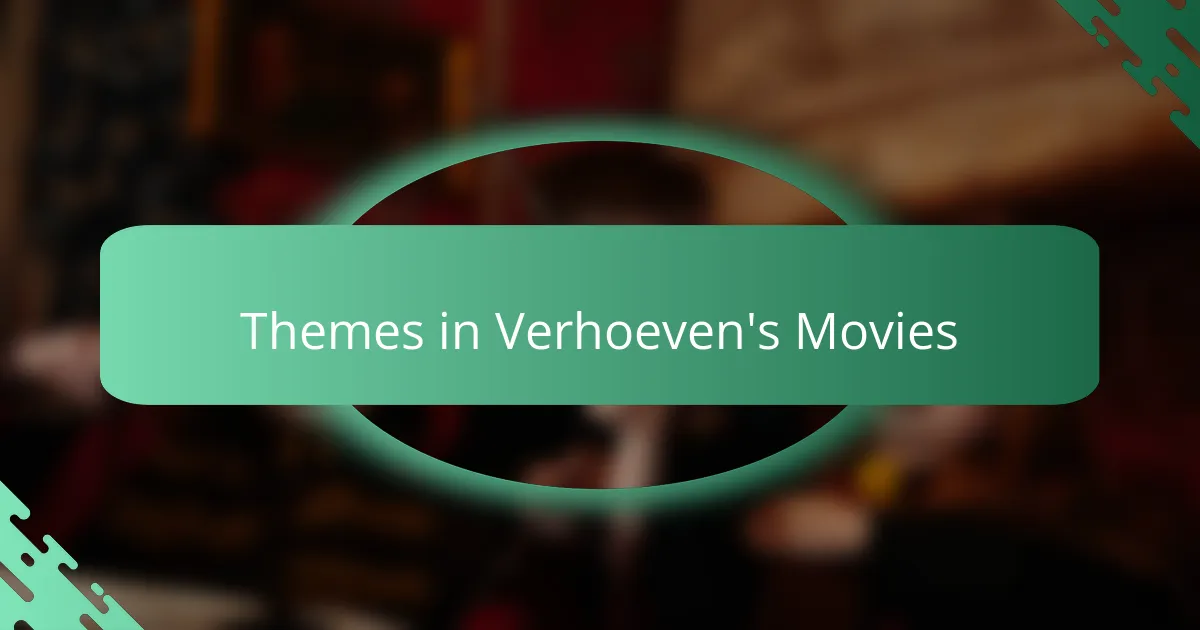Key takeaways
- Paul Verhoeven’s career spans diverse genres, consistently challenging societal norms through provocative storytelling.
- Key themes include the critique of authority, exploration of identity, and the interplay between desire and morality.
- His unique style blends humor with serious issues and combines satire with thought-provoking commentary.
- Verhoeven inspires deeper discussions about films’ impact on societal perceptions and individual beliefs.

Overview of Paul Verhoeven’s Career
Paul Verhoeven’s career is a fascinating tapestry woven with bold choices and significant impact. From his early days in Dutch cinema with films like “Turkish Delight” to his groundbreaking work in Hollywood with “Basic Instinct” and “Starship Troopers,” Verhoeven has consistently challenged societal norms and expectations. I remember watching “Robocop” for the first time; it was a thrilling experience that opened my eyes to the depth of storytelling mixed with social commentary.
His ability to navigate between genres—whether it’s sci-fi, action, or drama—shows his versatility and willingness to push boundaries. The way he creates characters that often oscillate between heroism and villainy intrigues me. It’s not just about entertainment; it’s a provocative mirror reflecting society back to itself.
Here’s how some key films in his career stack up against each other:
| Film | Year | Genre | Notable Theme |
|---|---|---|---|
| Turkish Delight | 1973 | Romantic Drama | Love and Loss |
| Robocop | 1987 | Sci-Fi Action | Corporate Control |
| Basic Instinct | 1992 | Thriller | Sexuality and Power |
| Starship Troopers | 1997 | Sci-Fi | Militarism and Fascism |
| Elle | 2016 | Psychological Thriller | Empowerment and Revenge |

Key Films Directed by Paul Verhoeven
When I think about “Turkish Delight,” it stands out as a pivotal film in Verhoeven’s early career. The raw portrayal of passion and heartbreak left a lasting impression on me. It’s fascinating to see how a romantic drama could evoke such honest emotions and reflect the complexities of love and loss.
“Robocop,” on the other hand, shook me to my core. The blend of action and social critique was something I hadn’t experienced before. It made me ponder the implications of technology in our lives and the consequences of corporate control. I still find myself revisiting those themes, which feel so relevant even today.
Then there’s “Basic Instinct,” which pushed boundaries and sparked intense conversations. The way Verhoeven explores sexuality and power dynamics was, at the time, both groundbreaking and controversial. I remember debating with friends after watching it, questioning how it challenges our perceptions of gender and desire. It certainly solidified Verhoeven’s reputation as a filmmaker unafraid to tackle difficult subjects head-on.

Analysis of Verhoeven’s Unique Style
Verhoeven’s unique style is characterized by his bold narratives and controversial themes that often challenge societal norms. I’ve always admired how he blends violence and sexuality with thought-provoking commentary, creating a visceral experience for the audience. For example, films like “Basic Instinct” and “Showgirls” may spark outrage, but they also provoke essential discussions about morality and exploitation in modern society.
His ability to intertwine humor with serious subjects is another hallmark of his work. I remember watching “Starship Troopers” and realizing that beneath the surface of sci-fi action, Verhoeven was critiquing militarism and propaganda. This layering of meaning is what keeps his films engaging, as there’s always something deeper to uncover and debate.
| Element | Verhoeven’s Style |
|---|---|
| Theme | Often provocative, exploring taboo subjects |
| Narrative | Blends satire with serious commentary |
| Visuals | Stylized violence and striking imagery |
| Characterization | Complex characters, often morally ambiguous |

Themes in Verhoeven’s Movies
Verhoeven’s films often delve into the complexities of human desire and morality, provoking critical thought about societal norms. I find it intriguing how, in “Basic Instinct,” he examines the interplay between sexuality and power. This nuanced portrayal invites viewers to reflect on their own perceptions of desire—are we mere observers or active participants in these dynamics?
Another recurring theme is the critique of authority and corporate power, particularly evident in “Robocop.” The film left me contemplating the implications of technology in our lives and how it shapes our interactions. Verhoeven’s sharp lens forces us to question the consequences of letting corporations dictate our realities. What does it say about our society when a programmed robot can be seen as a more empathetic hero than its human counterparts?
Lastly, the exploration of identity and revenge in “Elle” struck a personal chord with me. It showcases a woman’s complex journey through trauma and empowerment. I remember feeling conflicted about rooting for a character who operates in morally grey areas. Verhoeven masterfully challenges viewers to reconsider their own biases and judgments in the face of a character’s struggle for control and self-definition.

My Personal Journey with Verhoeven’s Works
As I reflect on my journey with Paul Verhoeven’s works, I can’t help but feel a mix of admiration and fascination. His unique blend of provocative themes and bold storytelling challenged my perceptions, pushing me to think critically about the narratives we consume. Watching “Basic Instinct” for the first time was a revelation; I remember being both captivated and unsettled by its audacity, which sparked countless discussions with friends.
Each of Verhoeven’s films seems to evoke a strong emotional response, from the eerie allure of “Total Recall” to the unsettling commentary in “Showgirls.” These movies don’t just entertain; they invite viewers into a moral and ethical labyrinth, leaving us to question our own beliefs. His ability to intertwine social commentary with entertainment is something I’ve come to appreciate deeply.
Here’s a quick comparison of a few of Verhoeven’s notable films:
| Film Title | Key Themes |
|---|---|
| Basic Instinct | Sexuality, Manipulation |
| Total Recall | Identity, Reality vs. Illusion |
| Showgirls | Ambition, Exploitation |
| RoboCop | Technology, Crime, Morality |

Insights Gained from Verhoeven
One of the most striking insights I’ve gained from Paul Verhoeven’s career is his fearless approach to storytelling. I remember watching “Showgirls” for the first time; while many critics shredded it, I found a raw reflection of ambition and desperation woven throughout the narrative. Verhoeven challenges norms and elicits strong emotions, regardless of how people may perceive his films.
Another valuable lesson is his knack for blending genres. His ability to mix satire with sci-fi in films like “Starship Troopers” opens up discussions about war and society in ways that are both entertaining and thought-provoking. It’s a reminder that cinema can provoke thought and disrupt conventions, which is something I strive to achieve in my own writing.
- Fearlessness in tackling controversial themes.
- Encouragement to elicit emotion, regardless of public opinion.
- Mastery of genre-blending to add depth and provoke thought.
- The importance of subtext and layered storytelling.
- Inspiration to challenge filmmaking conventions and critique societal norms.
